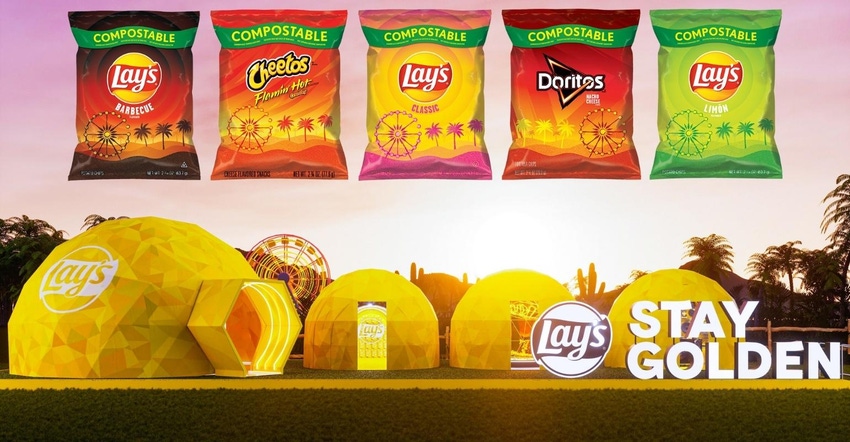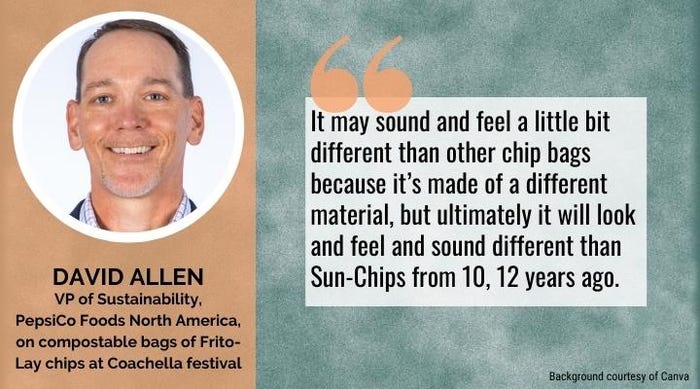Packaging Possibilities: Frito-Lay’s Compostable Packaging Experiment
Frito-Lay will debut new commercially compostable packaging — made from 85% renewable plant materials — at a popular music and art festival this April.

For two weekends this April (April 15-17 and April 22-24), Coachella festival-goers will be treated to more than just music and art. Frito-Lay has several “fresh” experiences planned, including the debut of commercially compostable bags for a variety of Lays chips.
Held in the Coachella Valley in California, this annual music and arts festival is known for championing sustainability, which is why corporate entity PepsiCo Foods North America decided to showcase its Lays chips there in compostable packaging. During the event, consumers can easily toss empty bags into clearly marked compost bins throughout the festival campgrounds.
David Allen, vice president of sustainability, PepsiCo Foods North America, talks about this trial of compostable packaging as part of the company’s journey to 100% recyclable, bio-compostable, or reusable packaging for the future.
In this 13-minute podcast, Allen explains:
• How this commercially compostable film is made and certified;
• Who its supplier partners are;
• PepsiCo’s investments in compostable packaging and future plans;
• How this packaging is different from the noisy compostable bag the company’s Sun-Chips brand tried and abandoned more than a decade ago.
PACKAGING POSSIBILITIES - Season 2: Episode 6
If you have a topic you’d like to propose for a future PACKAGING POSSIBILITIES episode, please email Lisa Pierce at [email protected].
TRANSCRIPTION IS AUTO GENERATED
Lisa McTigue Pierce
Hello, this is Lisa Pierce, executive editor of Packaging Digest, with another episode of Packaging Possibilities, a podcast that reveals what’s new and what’s next for packaging executives and engineers, designers and developers.
In this episode, I’ll be talking with David Allen, Vice President of Sustainability for PepsiCo Foods North America. The company’s Frito Lay business is going to debut a new compostable bag for potato chips at the Coachella Art and Music Festival for two weekends in April, the 15th through the 17th and the 22nd through the 24th.
David is going to give us some exciting details about this news. David, thanks for taking time to talk with us today. Welcome!
David Allen (guest)
Thank you so much, Lisa. It’s a pleasure to be with you today.
Lisa McTigue Pierce
It’s our pleasure as well. Always of thrilled to be talking with the folks at PepsiCo. So question number one, you’re going to give us some details about the, the new packaging, that compostable packaging. So why decide to debut this at Coachella, which is a festival in California known for its sustainability, correct?
David Allen (guest)
It is. Coachella is an exciting art and music festival food festival that has major, you know, cultural reach and impact. And it’s also championing sustainability to a large audience. So what better place to meet our consumers and show off our chips in a new commercially compostable bag?
Lisa McTigue Pierce
Indeed.
And just how many bags of the chips, or how many, how much of the chips are going to be there in these compostable bags?
David Allen (guest)
Yeah. So as you mentioned, it’s a, it is a two-weekend event and we’re going to have some of our consumers favorites. So Doritos Nacho Cheese, Cheetos Flamin’ Hot, Lays in multiple flavors. And we’ll have nearly 150,000 bags at the festival.
Lisa McTigue Pierce
Wowie zowie. Are you going to be giving these bags away or you’re going to be selling them there?
David Allen (guest)
No, we’ll be selling them, and they will be available for purchase at the food and beverage locations throughout the site.
Lisa McTigue Pierce
OK, so I’m guessing these are single-serve packages then, correct? Rather than like a family size?
David Allen (guest)
Correct. They’re single-serve packaging.
Lisa McTigue Pierce
OK, excellent. David, tell us a little bit more about the packaging material. It’s certified compostable and by what organization do you have the certification?
David Allen (guest)
Yeah, Lisa, it is. It’s certified commercially compostable in industrial facilities and that’s done by BPI. The Biodegradable Products Institute.
Lisa McTigue Pierce
OK, wonderful.
Another thing that makes them a little bit more sustainable than the traditional single-serve snack packaging, according to the press information that you’ve shared with us, is that the raw material production for these films produces approximately 60% lower greenhouse gas emissions (GHG) than traditional snack bags. David, what’s the source of that data?
David Allen (guest)
Well, it’s about the carbon evaluation of the source material, right? Polylactic acid or PLA, which is the core of what these bags are primarily made of … that’s primarily derived from corn and or sugar cane. So when you look at the carbon impact of the raw material production of corn and sugar cane, and then the amount of energy it takes to produce the resin, that’s how we evaluate the greenhouse gas emissions difference.
Lisa McTigue Pierce
OK. Again, through the press information that you’ve already released, the bag is 85% … is that PLA, correct?
David Allen (guest)
Yes, ma’am. Yep, there were renewable material. Yep.
Lisa McTigue Pierce
Renewable, thank you. And then what’s the other 15%?
David Allen (guest)
Well, as you would have in any multilayer flexible film bag, you’ve got sealant, you’ve got adhesive, you’ve got a small metal barrier, etc. But the primary content of the bag is PLA.
Lisa McTigue Pierce
OK. And are you able to share with us who the supplier is of this compostable film?
David Allen (guest)
Yes, we are. We have multiple partners in this area and the two primary partners that are the source of our resin are NatureWorks, who’s the source of our PLA resin, and then Danimer Scientific creates the final resin formulation that we use in the manufacturing of these bags.
Lisa McTigue Pierce
OK, excellent. Before David gives us more details about the future of compostable packaging at Frito-Lay, let’s take a short break for a special message.
Lisa Pierce here. Executive Editor of Packaging Digest. I’d like to invite you to the upcoming WestPack in-person event in Anaheim California April 12-14. Held at the Anaheim Convention Center, WestPack serves the entire packaging community — from design engineers to distribution leaders. The event helps packaging professionals find creative solutions and efficient automation systems. Sign up today at WestPackShow.com.
Now, let’s get back to our Packaging Possibilities podcast.
Lisa McTigue Pierce
David, let’s talk a little bit more about this compostable bag that you are debuting at Coachella. So is … will Frito-Lay continue to package a variety of the chips in the compostable packaging after the festival? What are the plans for potentially rolling this out this packaging?
David Allen (guest)
Lisa, right now our focus is on Coachella and what we hear and what we learn from our consumers at that point. I would like to point out that we do have another compostable bag that is already in the in the marketplace in Whole Foods, our Off the Eaten Path product, certain SKUs [stock-keeping units] of that is available as well.
Lisa McTigue Pierce
OK, excellent. Yes, I do recall seeing information about Off the Eaten Path a little bit earlier. Actually, it was one of the packages that Packaging Digest identified as one of the top 12 Best New Food Pack … Food and Beverage Packages of 2021. So yes, very exciting for that. And I’m assuming that that is … well, I shouldn’t assume. I’ll ask. David, are those then going to be in single-serve packaging as well? Because I do believe the Off the Eaten Path is a family size, was it not?
David Allen (guest)
The Off the Eaten Path was, it was a larger family sized bag. That is correct, yes.
Lisa McTigue Pierce
OK. So is that the … So what sizes are you going to be using for the other chips? And is there still plans to roll this out in other product lines?
David Allen (guest)
Well, again, right now we’re focused on Coachella. What we learn, what our consumer response is and we will then determine what’s the … what the appropriate next steps are. Long term, we have a vision as a company that our packaging need never become waste. And we’ve got, we’re committed to designing 100% of our packaging to be recyclable, bio-compostable, or reusable in the future. So we’re working towards what the right mix of that is.
Lisa McTigue Pierce
OK, excellent. You know, I can’t help but ask and I’m sure you get this all the time … that there was an earlier version of a compostable bag that you guys … that didn’t quite win over consumers when it first came out because of how loud the packaging was. And of course, I’m referring to the Sun-Chips bag from 2010. So, we’re talking a dozen years ago. Quite a bit has changed with the packaging technology, specifically for compostability, in the last more than decade. So … but would you mind giving us a little bit of insight into how this package this compostable film is different and maybe better than the earlier version?
David Allen (guest)
Well, I think you hit it right. This was over 10 years ago. So there’s been a lot of research and development in materials and processes in compostability since then. And so we’ve certainly learned from that and we’ve applied all of those learnings over the course of the next, of the last 10 years in order to come up with the current formulation. Certainly, it … that’s going to be a little bit different. It may sound and feel a little bit different than other chip bags because it’s made of a different material, but ultimately it will look and feel and sound different than Sun-Chips from 10, 12 years ago.

Lisa McTigue Pierce
OK. And I know that you’re focusing on Coachella right now and the plans for the future are still, you know, out there. But I’m just wondering, the consumers … and this is industrial compost. There’s not a whole lot of infrastructure in the United States yet for industrial composts and some of them actually prefer not to take packaging because there’s not a whole lot of nutrients in it when it does breakdown. In the future, if you do go in this direction, how are the consumers going to get these bags to those industrial compost facilities?
David Allen (guest)
Yeah, that’s a really good question because infrastructure, availability, and what the distribution is across the United States is a significant limiting factor or at least a concern that we have to take in mind. So, you know, through processes like this, we’re looking to both educate and explore. But if you look at what we’re doing in Coachella, we have partnered with FlipSide to collect the compostable bags, you know, there on site and send them to a local commercial composter, American Reclamation, that we’re partnering with.
But then to your question more broadly, this is something that we’ve tried to explore through our Off the Eaten Path program with Whole Foods, where consumers were able to scan a code on the back of the bag and then get instructions where they could send that, so we could ensure that that bag was properly commercially compostable.
So we’re in learning mode right now to try and understand what the best solutions will be long term.
Lisa McTigue Pierce
OK, excellent. And no pressure, David, but you know, being Frito-Lay and PepsiCo, there are a lot of eyes on you guys to see what it is that you do and how successful it is. So, we’ll be keeping an eye on all this as well.
David, thank you so much for your time. I really appreciate you talking with us today.
David Allen (guest)
Absolutely. Thanks for the opportunity, Lisa.
About the Author(s)
You May Also Like




